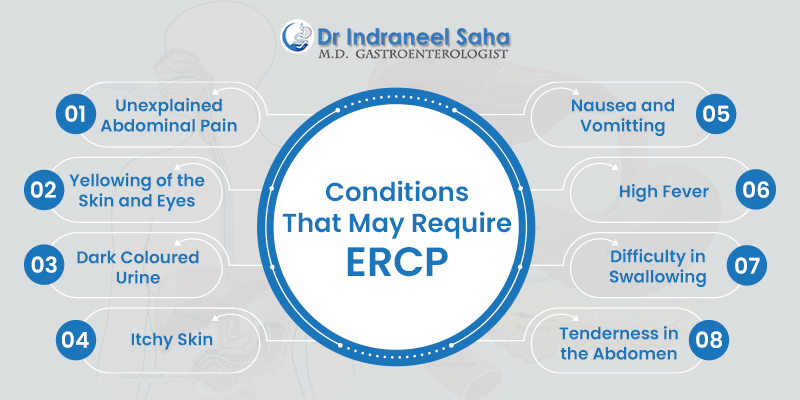- 19th Mar, 2025
- ERCP Stone Extraction
ERCP: What It Is, Why It’s Done, Procedure & Complications
Our digestive system plays a major role in the overall functioning and well-being of individuals. Whether it’s the liver or the small intestine, any disruptions in the digestive or gastrointestinal tract can prove to be life-threatening.
To avoid this, early diagnosis and treatment are extremely crucial for a successful recovery from the disease. One of the advanced procedures to detect GI diseases is endoscopic retrograde cholangiopancreatography (ERCP). It not only diagnoses the condition but also helps in treating it without the need for any surgery.
In this blog, we will cover everything related to the procedure, including its purpose, benefits and complications.
What is ERCP?
Endoscopic retrograde cholangiopancreatography, or better known as ERCP, is a minimally invasive and specialised procedure that is used to diagnose and treat problems in the liver, gallbladder, pancreas and bile ducts.
ERCP combines both the method of endoscopy (a thin, flexible tube with a camera attached) and X-ray to get images of the pancreatic and bile ducts. One of the examinations suggested by most gastroenterologists is ERCP stone extraction, which involves removal of the stones that often block the gallbladder and pancreatic ducts.
It also helps healthcare providers to identify conditions such as tumours or strictures.
How does the ERCP Procedure Work?
An ERCP procedure typically takes around 30 to 60 minutes. However, it can also take a longer time depending on the complexity of the condition.
Prior to the process, patients are sedated to numb the throat and minimise any kind of discomfort. The doctors then insert an endoscope, which has a camera attached, through the mouth into the duodenum. A contrast dye is then injected to capture images of the pancreatic and bile ducts, which eventually guides the doctors to carry out the procedure. If the process is ERCP stone extraction, the stones are either removed or broken down into smaller pieces.
ERCP is an outpatient procedure and patients are only monitored for a few days until the anaesthesia wears off. Moreover, the recovery period is also quicker and patients can return to their daily routine and normal diet within a few days.
Purpose of an ERCP Procedure
You might be required to undergo an ERCP procedure if your doctor feels that there is a blockage in the pancreatic or bile ducts. Some of the common conditions where this procedure is mostly performed are as follows:
- Gallstones
- Tumours in the pancreas and bile ducts
- Acute pancreatitis
- Infections
Signs Indicating that you might need an ERCP?
Here are the following symptoms that indicate that you might need to undergo an ERCP technique to find the exact cause of your:
- Unexplained abdominal pain
- Yellowing of the skin and eyes
- Dark coloured urine
- Itchy skin
- Nausea and vomitting
- High fever
- Difficulty in swallowing
- Tenderness in the abdomen

If you experience any of the signs for a long time, it highly signals that your bile or pancreatic ducts are most probably blocked. To confirm the presence of any abnormalities, make sure to consult your doctor without any delay.
Are there Any Risks Associated with ERCP?
ERCP stone extraction needs to be performed meticulously under the guidance of an expert who is trained in such procedures.
Otherwise, the process can result in complications such as the following:
- Perforation in the small intestine, stomach, or esophagus
- Bleeding at the site of the incision
- Infection in the ducts
Before an ERCP, always discuss your medical history or any chronic health issues to know if you are an eligible candidate.
Conclusion
ERCP is an advanced procedure with major benefits. While it is not for everyone, in certain patients, especially those with issues in the pancreatic and bile ducts, they can notice a significant difference in their lives.